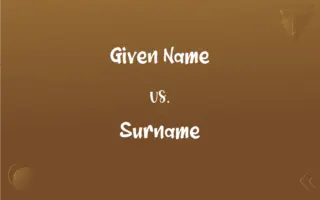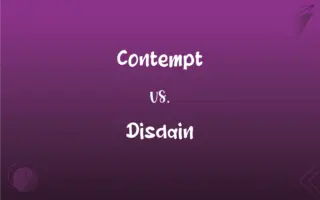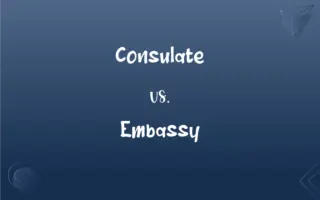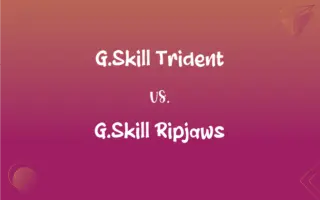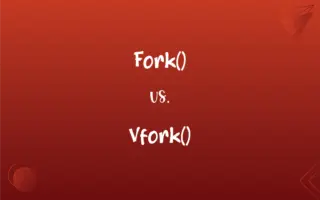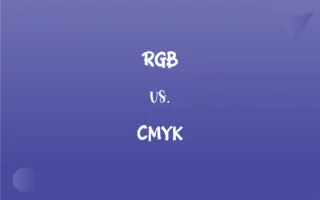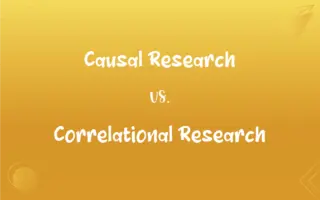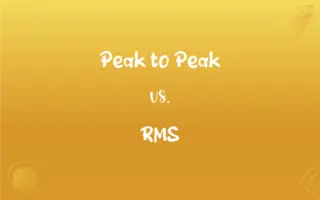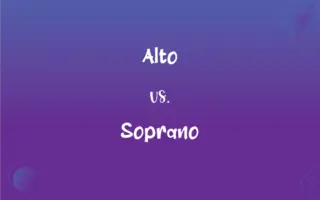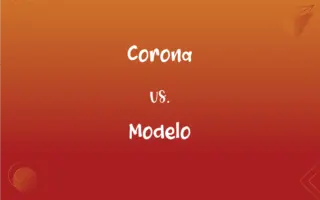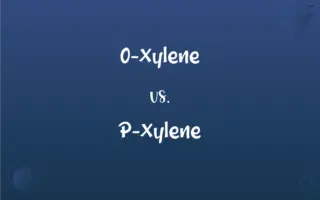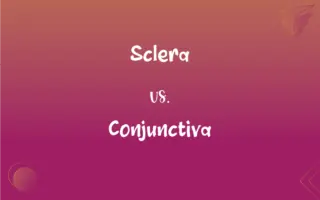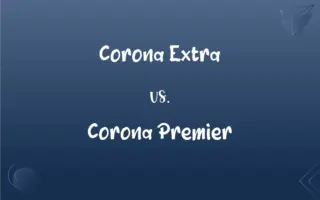Democracy vs. Mobocracy: What's the Difference?
Edited by Janet White || By Harlon Moss || Updated on October 17, 2023
Democracy is a system where citizens participate in decision-making, while mobocracy is rule by the majority without respect for minority rights or law.

Key Differences
Democracy is a cherished system of governance practiced by many nations worldwide. It allows citizens to have a voice in decision-making processes through voting, representation, and various institutions. Democracy thrives on principles such as equality, freedom, and rule of law. On the other hand, mobocracy is a derogatory term describing a situation where the majority imposes its will without considering the rights or views of the minority. It often implies a chaotic, undisciplined rule without respect for established laws or standards.
Democracy, in its pure form, promotes participation, inclusivity, and deliberation. Elected representatives, often chosen by the citizens, work to implement policies and laws that reflect the will and benefit of the people. Mobocracy, in contrast, is marked by the tyranny of the majority, where decisions are hastily made, often driven by emotions, passions, or immediate desires without proper deliberation or consideration for the greater good.
Systems based on democracy often have checks and balances in place to ensure that no single group or entity can dominate or oppress others. This balance is achieved through independent judiciary, constitutionally set boundaries, and separated powers. Mobocracy lacks these stabilizing factors, and decisions are often impulsive, driven by the loudest voices or dominant groups, regardless of the overall impact on society.
A thriving democracy respects individual rights, minority opinions, and operates under a framework of laws and constitution. It understands the value of deliberation, debate, and long-term planning. Mobocracy, conversely, can be swayed by popular sentiment of the moment, and may disregard long-term implications or minority protections.
While both democracy and mobocracy involve the participation of the majority, the distinction lies in the underlying principles, methodologies, and outcomes. Democracy aims for an inclusive, lawful, and balanced approach to governance, while mobocracy tends to be reactive, often chaotic, and may sideline the principles of justice and fairness.
ADVERTISEMENT
Comparison Chart
Definition
System of governance by the people
Rule dominated by majority without rule of law
Decision-making
Deliberative and inclusive
Often impulsive and reactive
Respect for rights
Respects individual and minority rights
May disregard minority rights
Guiding principles
Rule of law, freedom, equality
Majority rule without legal or moral constraints
Stability
Structured with checks and balances
Can be chaotic and unpredictable
ADVERTISEMENT
Democracy and Mobocracy Definitions
Democracy
Governance by elected representatives of the people.
The nation celebrated its transition to democracy after decades of dictatorship.
Mobocracy
Rule by the majority without respect for laws or minority rights.
The town's decision-making descended into mobocracy when angry crowds made impulsive decisions.
Democracy
A system where citizens have a voice in decision-making.
In a democracy, voting is a fundamental right of every citizen.
Mobocracy
Governance lacking structured deliberation and debate.
The assembly's hasty decisions were indicative of mobocracy, not thoughtful governance.
Democracy
A system where rule of law and individual rights are upheld.
Democracy ensures that everyone's rights are respected, regardless of their background.
Mobocracy
Governance dominated by the loudest or most forceful voices.
Without proper checks and balances, the city council was overtaken by mobocracy.
Democracy
Governance based on the principle of majority rule with respect for minority rights.
In a democracy, the majority's decisions are tempered by protections for the minority.
Mobocracy
A chaotic and unstable form of majority rule.
The sudden policy changes were the result of mobocracy rather than a stable democratic process.
Democracy
A political system promoting freedom of speech and assembly.
Democracy allows for open debates and diverse opinions in the public sphere.
Mobocracy
A system where decisions are made based on immediate passions or popular sentiments.
The festival was canceled due to mobocracy, with no consideration for its cultural importance.
Democracy
Government by the people, exercised either directly or through elected representatives.
Mobocracy
Political control by a mob.
Democracy
A political or social unit that has such a government.
Mobocracy
The mass of common people as the source of political control.
Mobocracy
Rule or control by the mob (or by the mass of ordinary people); a mob as a politically powerful force.
Mobocracy
A condition in which the lower classes of a nation control public affairs without respect to law, precedents, or vested rights.
It is good name that Dr. Stevens has given to our present situation (for one can not call it a government), a mobocracy.
FAQs
Can mobocracy arise in democratic societies?
Yes, if democratic processes are bypassed or eroded, mobocracy can emerge.
Is democracy always beneficial for a country?
While democracy promotes participation and rights, its effectiveness depends on its implementation and civic education.
Does democracy ensure equality?
Democracy promotes equality, but its realization depends on laws, policies, and societal values.
Is mobocracy inherently bad?
Mobocracy can lead to hasty decisions and disregard for rights, often making it detrimental to governance.
Can mobocracy be seen as a form of direct democracy?
While both involve majority sentiments, mobocracy lacks the structured, lawful approach of direct democracy.
Does mobocracy have any benefits?
While it can show immediate popular sentiments, its long-term impacts are often detrimental due to lack of deliberation.
Can democracies evolve into other forms of governance?
Yes, if democratic principles are eroded, democracies can transform into other systems, including autocracies.
Why is rule of law important in democracy?
Rule of law ensures fairness, predictability, and justice, essential pillars of democracy.
What role do institutions play in democracy?
Institutions provide structure, ensure checks and balances, and uphold the principles of democracy.
Why is civic education important in a democracy?
It equips citizens with knowledge and skills to participate effectively and responsibly in democratic processes.
Do all democracies function the same way?
No, democracies vary based on cultural, historical, and political contexts.
Is mobocracy a new concept?
The term might be modern, but the idea of majority rule without respect for laws or rights has ancient roots.
Are there different forms of democracy?
Yes, there are forms like direct democracy, representative democracy, and participatory democracy, among others.
Can mobocracy lead to violence?
Mobocracy can result in impulsive actions, which might include violence or aggression.
How can democracies prevent sliding into mobocracy?
By upholding rule of law, educating citizens, and ensuring checks and balances in governance.
How does media influence both democracy and mobocracy?
Media can inform and educate in a democracy, but can also amplify mob sentiments in a mobocracy.
Are all decisions made by a majority indicative of mobocracy?
No, it's the disregard for law and minority rights that distinguishes mobocracy from democratic majority decisions.
How does mobocracy affect minority groups?
Mobocracy can sideline or oppress minority voices in favor of the majority sentiment.
Are protests a sign of mobocracy?
Not necessarily. Peaceful protests can be a sign of a healthy democracy, while violent or lawless ones may hint at mobocracy.
What ensures minority rights in a democracy?
Legal frameworks, institutions, and a culture of respect safeguard minority rights in a democracy.
About Author
Written by
Harlon MossHarlon is a seasoned quality moderator and accomplished content writer for Difference Wiki. An alumnus of the prestigious University of California, he earned his degree in Computer Science. Leveraging his academic background, Harlon brings a meticulous and informed perspective to his work, ensuring content accuracy and excellence.
Edited by
Janet WhiteJanet White has been an esteemed writer and blogger for Difference Wiki. Holding a Master's degree in Science and Medical Journalism from the prestigious Boston University, she has consistently demonstrated her expertise and passion for her field. When she's not immersed in her work, Janet relishes her time exercising, delving into a good book, and cherishing moments with friends and family.













